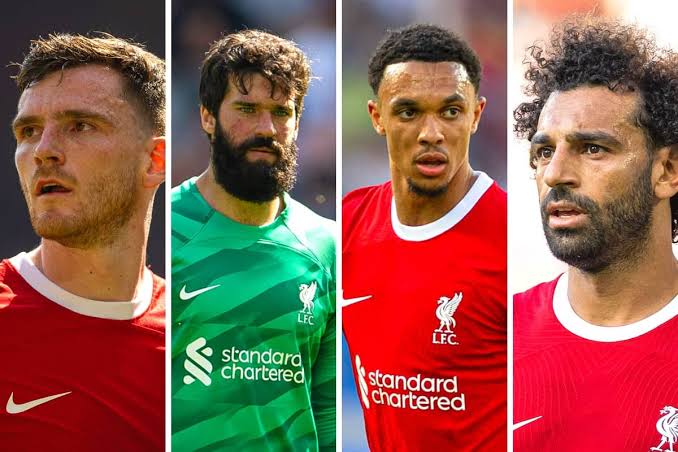Michael Owen’s Perspective on Alexander Isak’s Transfer Saga: A Measured Voice Amid the Storm

The summer transfer window of 2025 has been dominated by one of the most contentious transfer sagas in recent memory, with Alexander Isak’s desire to leave Newcastle United for Liverpool creating a storm of controversy that has divided opinion across the football world. While many pundits and former players have been quick to condemn the Swedish striker’s approach to forcing his exit from St. James’ Park, one voice has stood apart from the chorus of criticism: Michael Owen, the former Liverpool and Real Madrid striker, who has offered a more nuanced and understanding perspective on Isak’s predicament.
Alexander Isak’s journey at Newcastle United has been nothing short of remarkable since his arrival from Real Sociedad. The 25-year-old Swedish international has established himself as one of the Premier League’s most clinical forwards, playing a pivotal role in Newcastle’s recent success, including their trophy triumph and qualification for the Champions League. His performances have not gone unnoticed, with Liverpool identifying him as a prime target to bolster their attacking options.
However, what should have been a straightforward transfer negotiation has evolved into one of the most acrimonious sagas in recent memory. Isak’s desire to move to Anfield has been met with resistance from Newcastle United, who are understandably reluctant to part with their star asset. The situation has deteriorated to the point where the striker has taken the unprecedented step of refusing to train with his current club and has made it clear that he will not feature for Newcastle again, regardless of whether his desired transfer materializes.
The Swedish forward’s absence from Newcastle’s pre-season tour of Asia, choosing instead to train with his former club Real Sociedad, marked the beginning of what would become an increasingly bitter dispute. His actions have drawn widespread criticism from various quarters of the football community, with many former players and pundits expressing their disapproval of his methods
In stark contrast to the wave of criticism that has followed Isak’s actions, Michael Owen has chosen to take a more measured and empathetic approach to the situation. Speaking to Chronicle Live via 247Bet, the former England international demonstrated a level of understanding that has been notably absent from much of the commentary surrounding the transfer saga.
Owen’s perspective is particularly significant given his own experience of high-profile transfers during his playing career. His move from Liverpool to Real Madrid in 2004 was one of the most talked-about transfers of that era, and his subsequent moves throughout his career have given him unique insights into the complexities and pressures that players face when seeking to advance their careers.
“He’s laid his cards on the table, hasn’t he?” Owen observed, acknowledging the clarity with which Isak has communicated his intentions. “It’s quite clear that he wants to move. Whether Newcastle fans would forgive and forget is a big question. I don’t know. I mean, he’s done exceptionally well for them, you know, they’ve won a trophy, they’re into the Champions League.”
This acknowledgment of Isak’s contributions to Newcastle’s success is crucial to Owen’s argument. Rather than simply focusing on the player’s current actions, Owen recognizes the context of what Isak has delivered for the club. The striker has been instrumental in Newcastle’s transformation from a relegation-threatened team to Champions League participants, and Owen suggests that this should be factored into any assessment of the current situation.
One of the most compelling aspects of Owen’s defense of Isak centers around the concept of broken promises. The former striker suggests that there may have been prior agreements or understandings between Isak and Newcastle regarding his future, which have not been honored by the club.
“He’s done his side of the bargain quite clearly by his statement,” Owen explained. “He feels like that’s enough and that they’ve had previous chats which suggest that he’s almost not free to leave but, you know, if certain things were done then he might be free to go, but it doesn’t seem like Newcastle are playing that game.”
This perspective was later validated by Isak himself, who broke his silence on social media with a statement that directly addressed the issue of broken promises. The Swedish striker wrote: “I’ve kept quiet for a long time while others have spoken. That silence has allowed people to push their own version of events, even though they know it doesn’t reflect what was really said and agreed behind closed doors. The reality is that promises were made and the club has known my position for a long time.”
Isak’s statement continues: “To now act as if these issues are only emerging is misleading. When promises are broken and trust is lost, the relationship can’t continue. That’s where things are for me right now – and why change is in the best interests of everyone, not just myself.”
This revelation adds significant context to Owen’s perspective and suggests that the situation may be more complex than it initially appeared. If indeed there were agreements in place that have not been honored, it provides a different lens through which to view Isak’s actions.
Perhaps the most thought-provoking aspect of Owen’s commentary relates to what he perceives as a double standard in how player transfers are typically viewed. The former striker highlighted an interesting inconsistency in public attitudes toward transfer situations depending on who is initiating the move.
“This whole scenario is an interesting one because nine times out of 10 when a move comes about it’s normally a club forcing a player and nobody’s bothered, nobody says anything despite any kids that are in school or any families that have settled in an area or anything else like that,” Owen observed.
This observation strikes at the heart of a fundamental imbalance in modern football. When clubs decide to sell players against their wishes, forcing them to uproot their families and leave established communities, such decisions are generally accepted as part of the business of football. However, when a player seeks to take control of their own career path, particularly when they believe promises have been broken, they face intense scrutiny and criticism.
“Nobody cares really about a footballer. But when it’s on the other foot, it’s really interesting to see that everybody, you know, the whole world goes into meltdown and how dare somebody try and force a move through? I’m not going to sit here and criticize Isak,” Owen stated firmly.
This perspective challenges the conventional narrative surrounding player power and transfer requests. Owen’s argument suggests that the criticism leveled at Isak may be hypocritical, given the frequency with which clubs make unilateral decisions about players’ futures without facing similar condemnation.
Central to Owen’s defense of Isak is his understanding of the player’s professional ambitions and the finite nature of a football career. Owen acknowledges that while he wouldn’t have personally taken the same actions as Isak, he can understand the motivation behind them
“I wouldn’t have done that myself in terms of the actions he’s taken, but I do get that he’s a great player that wants to get to the top of his game and he’s obviously not being allowed the move that he’s desperate for. And you get one short career and he’s wanting to join probably the best team in the world at the moment,” Owen explained.
This recognition of Liverpool’s current status and Isak’s desire to compete at the highest level adds another dimension to the discussion. The Swedish striker is at a crucial stage of his career, and Owen’s perspective acknowledges that players have limited time to achieve their maximum potential. The opportunity to join a club of Liverpool’s caliber, particularly under their current successful trajectory, may not come around again.
Owen’s own career trajectory provides credibility to this argument. His move from Liverpool to Real Madrid was driven by similar ambitions to compete at the highest level, and his subsequent success with both clubs and the England national team validates the importance of such career decisions.
While Owen has taken a more understanding approach to Isak’s situation, other prominent figures in football have been far more critical. The contrast between these perspectives provides insight into the different philosophies that exist within the football community regarding player conduct and transfer negotiations.
Alan Shearer, the former Newcastle United and England striker, has been particularly vocal in his criticism of Isak’s approach. Speaking on Match of the Day alongside Wayne Rooney, Shearer emphasized the importance of honoring contractual obligations and maintaining professional standards.
“You didn’t refuse to train, you didn’t refuse to play, so there is a way to do it and Alex is not going about it the right way at all,” Shearer said, referencing Rooney’s own experience of requesting transfers while maintaining his professional commitments. “You have to feel sorry for the players and the manager.”
Shearer’s criticism extends to the impact on Newcastle’s supporters, highlighting the financial sacrifices made by fans who continue to support the club while one of their star players refuses to participate. “The players today are busting a gut for the football club, for the thousands of fans that have travelled all that way to Villa Park. They’re giving their all. Yet they’re looking at another player, wherever he is, refusing to play despite having a three-year contract and on over £100,000-a-week.”
Similarly, Liverpool legend Jamie Carragher has expressed his disapproval of Isak’s methods, telling iNews: “Transfers happen every summer but I don’t think you should ever go toxic or nuclear where you refuse to play or train. That may be what forces the move in the end, so who am I to say it’s wrong? But I just don’t like it. They’re paying his wages, they’ve been great to you, you’ve been great for them, just keep training, keep playing and hope a deal gets done.” These contrasting viewpoints highlight the complexity of the situation and the different values and experiences that shape how former players view such controversies.
The transfer saga has significant financial and strategic implications for all parties involved. Liverpool’s initial bid of $148 million plus add-ons was promptly rejected by Newcastle United, who are reported to value Isak at around $202 million. The substantial financial figures involved reflect both Isak’s quality as a player and Newcastle’s determination to retain their star asset.
From Newcastle’s perspective, losing Isak would represent a significant blow to their sporting ambitions. The Swedish striker has been central to their recent success, and replacing a player of his caliber would be both expensive and challenging. The club’s Saudi Arabian ownership has provided substantial financial resources, but even they would struggle to find adequate replacements for such a key player in the current market.
For Liverpool, securing Isak would represent a significant statement of intent and provide them with a world-class striker to compete with the best teams in Europe. However, the protracted nature of the negotiations and the controversy surrounding Isak’s conduct may complicate their pursuit of the player.
The situation is further complicated by Newcastle’s need to secure adequate replacements before sanctioning any departure. Reports suggest that the club has been pursuing Brentford’s Yoane Wissa as a potential replacement, but negotiations have stalled due to differing valuations between the clubs
Owen’s perspective brings attention to the human element of professional football that is often overlooked in transfer discussions. His recognition of the psychological and emotional factors that influence player decisions provides a more complete picture of the situation.
“It’s just a sad situation when it’s played out in the world’s press and he’s obviously not coming out well, let’s say, from a reputational point of view,” Owen observed, acknowledging the personal cost that Isak is paying for his stance.
This recognition of the reputational damage that Isak is suffering highlights one of the key costs of his approach. Regardless of the outcome of the transfer saga, the Swedish striker’s reputation has undoubtedly been affected by the controversy surrounding his conduct. Owen’s acknowledgment of this personal cost demonstrates his understanding of the complex calculations that players must make when deciding how to pursue their career ambitions.
The psychological pressure on players in such situations is often underestimated. The constant media scrutiny, fan criticism, and professional uncertainty can take a significant toll on an individual’s mental health and well-being. Owen’s more empathetic approach recognizes these human factors that are often absent from purely transactional discussions of player transfers.
The current situation with Isak is not unprecedented in football history, and examining similar cases provides context for understanding both the player’s acti















